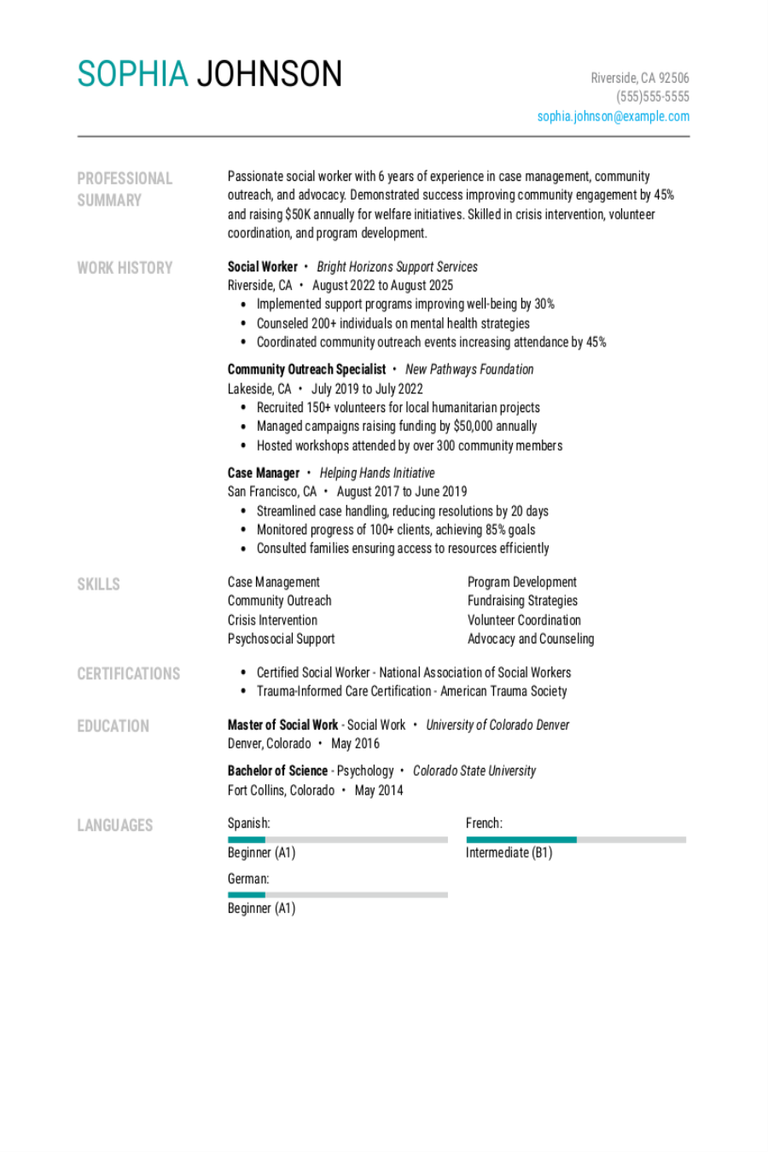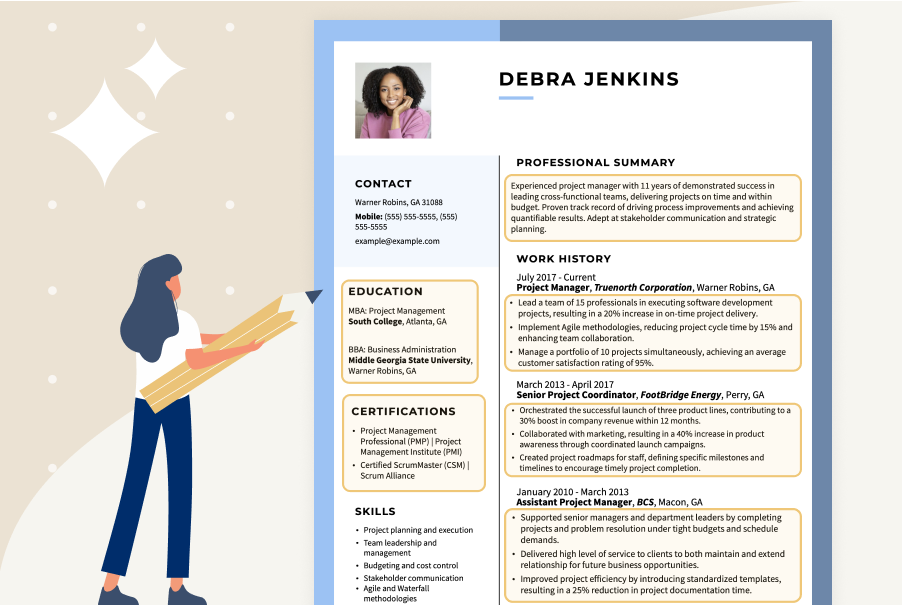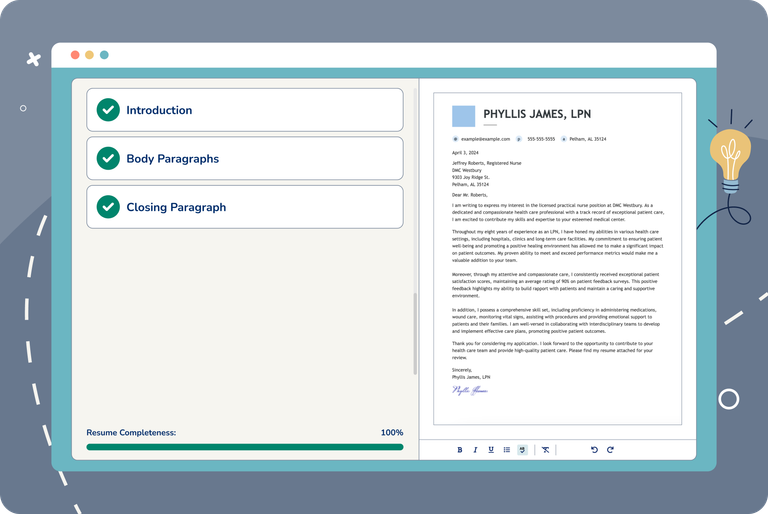Social Work Skills for a Resume (Examples & Tips)

Our customers have been hired at: *Foot Note
AI Resume Skills Generator

Working in social work is challenging and deeply rewarding, requiring a combination of empathy, resilience and dedication. Social workers engage with individuals, families and communities to address and overcome various issues such as poverty, abuse, addiction and mental health challenges. They provide essential support through counseling, advocacy, and connecting clients to necessary resources and services. This profession demands strong problem-solving skills, navigating complex systems, and a commitment to social justice.
The US Bureau of Labor Statistics projects employment in social work will grow 7% through 2032, with approximately 63,800 job openings per year expected over the next decade. You must have the right skills to stay ahead of the curve.
Table of Contents
Get started with MyPerfectResume today!
- Build a resume on any device
- Pick an ATS-friendly template
- Tailor with AI copy suggestions
Make a resume with MyPerfectResume
Our Resume builder can help you write the perfect resume. Start Now!
What are social work skills?
Social work skills are comprehensive abilities that enable social workers to support, advocate for, and empower their clients effectively. These skills include soft skills, such as empathy, which allows social workers to connect with and understand the experiences of those they help, and interpersonal skills, which are essential for clearly conveying information and building relationships. Active listening is crucial for ensuring clients feel heard and understood, while problem-solving and critical thinking skills are necessary for identifying issues and developing practical solutions.
Examples of social work skills
Whether you're a seasoned practitioner looking to refine your skill set or a newcomer eager to learn about the competencies vital to success in social work, our curated examples of top social worker skills offer valuable insights and inspiration.
Hard skills
Hard skills are specific, teachable abilities or knowledge sets. Social workers need hard skills to handle the technical and administrative aspects of their roles efficiently.
Hard skills you can use to excel at social work include:
- Case management
- Clinical assessment
- Crisis intervention
- Report writing
- Trauma-informed practice
- Legal knowledge
- Resource coordination
- Counseling techniques
- Time management technology
Soft skills
Soft skills facilitate effective communication, trust and teamwork. Social workers need soft skills to build rapport with clients, collaborate with colleagues, and navigate the complex emotional landscapes of their work.
Here are 10 must-have soft social worker skills:
- Active listening
- Case management
- Collaboration
- Communication
- Critical thinking
- Cultural competence
- Flexibility
- Problem-solving
- Resilience
- Time management
Computer skills
Computer skills are the ability to effectively use various software and digital tools to perform tasks such as data entry, communication and research. Social workers need computer skills to manage client information efficiently, communicate with stakeholders, and access resources and information necessary for providing comprehensive care.
Here are 10 computer skills that will help you be successful as a social worker:
- Case management software
- Electronic health records (EHR)
- Microsoft Office Suite
- Data entry
- Email communication
- Internet research
- Social media
- Basic IT troubleshooting
- Confidentiality and security
- Virtual meeting platforms
Interpersonal skills
Interpersonal skills are vital for social workers to understand their clients' needs, provide empathic support, and work within multidisciplinary teams to deliver holistic and client-centered care.
Vital interpersonal skills for social workers include:
- Community engagement
- Relationship building
- Boundary setting
- Patience
- Leadership
- Empathy
- Active listening
- Trustworthiness
- Open-mindedness
- Empowerment
Transferable skills
Transferable skills are abilities and qualities that can be applied across different roles, industries, and situations. Social workers need transferable skills because they often work in diverse settings with many clients and issues.
Here are 10 valuable transferable social work skills:
- Adaptability
- Advocacy
- Conflict management
- Decision-making
- Documentation
- Ethics
- Mediation
- Negotiation
- Public speaking
- Self-awareness
How to improve your social work skills
Improving social work skills is crucial for professional growth and effectiveness in supporting clients and addressing complex social issues. Social workers must enhance their skills to adapt to clients’ evolving needs, stay abreast of best practices, and navigate changing organizational and societal contexts.
Here are some effective ways to enhance your social work skills:
- Develop a practice of continuous education and training. Attend workshops, seminars and conferences and take online courses to learn new social work techniques, update your knowledge and gain insight into emerging trends in social work.
- Seek regular supervision and mentorship from experienced social workers or supervisors.
- Connect and collaborate with your peers in the social work industry. Peer support groups, professional affiliations, and online communities can provide a forum for sharing experiences, learning from different perspectives, and developing knowledge.
- Consider clinical supervision, shadowing, or consultation with licensed therapists or counselors to enhance your therapeutic skills, address clinical challenges, and ensure ethical and effective practice in counseling and therapy.
- Take time regularly to reflect on your strengths, areas for improvement and the impact of your work with clients.
- Seek client, colleague and supervisor feedback to identify where you can improve and set professional development goals.
How to highlight social work skills on your resume
Be strategic about incorporating social work skills into your resume. Don’t just highlight these skills in a dedicated skills section for maximum impact. While a dedicated skills section is essential to showcase your job-relevant abilities, it's also effective to highlight these skills throughout your resume to amplify their significance.
Here’s how to display your social work skills in your resume in seven steps:
- First, consider your resume format. There are three standard formats, each of which will highlight your social work skills differently.
- Next, choose a resume template that will display your social work skills clearly and professionally.
- Prepare to write your resume by reviewing the job description and matching your social work skills and accomplishments to the job requirements.
- To make a great first impression, add two or three of your top skills to your professional summary or resume objective.
- Use your work history section to show what you’ve accomplished with your social work skills. "Implemented a new case management system that improved efficiency by 30%, resulting in a 20% increase in client satisfaction scores over six months."
- Create a skills section to highlight the required skills. To make each one stand out, you might create categories to showcase specific types of skills, like,” “Interpersonal Skills,” and “Hard Skills.”
Pro-tip: Use action verbs to bring your social work skills to life.
Common tools and technologies used in social work
Social workers utilize various tools and technologies to enhance their practice and better serve their clients in an increasingly digital world. These tools enable social workers to streamline administrative tasks, improve communication with clients and colleagues, access resources efficiently, and track client progress more effectively.
Here are some common tools and technologies used in social work:
- Case management software is a platform designed to organize and manage client information, track services provided, and facilitate communication among team members.
- Electronic health records (EHR) are digital systems for documenting client interactions, medical histories, treatment plans and progress notes.
- Telehealth platforms are videoconferencing tools that enable remote counseling sessions, consultations and client meetings, increasing access to services.
- Social media and online resource platforms and websites disseminate information, raise awareness, and connect clients with community resources and support networks.
- Mobile apps are designed to schedule appointments, track medication adherence, provide self-help resources, and enhance client engagement and empowerment.
Best social work certifications
Certifications on your social work resume bolster your professional credibility, demonstrate your commitment to the profession, showcase your specialized knowledge to employers and clients, and pave the way for career advancement opportunities.
When selecting a certification, carefully review the specific requirements and prerequisites, and choose those that align with your career objectives and passions.
Several valuable certifications in the social work industry are tailored to various areas of expertise and career aspirations.
Here are some widely recognized certifications in social work:
- Licensed Clinical Social Worker (LCSW)
- Certified Social Work Case Manager (C-SWCM)
- Certified Advanced Social Work Case Manager (C-ASWCM)
- Certified School Social Work Specialist (C-SSWS)
- Certified Advanced Children, Youth, and Family Social Worker (C-ACYFSW)
- Certified Social Work Manager (CSWM)
Key takeaways
Before you leave this guide to social work skills for a resume, remember these key points:
- Social workers need a variety of skills, from interpersonal to technical, to guide and assist clients with a range of needs.
- Connecting and collaborating with your peers in the social work industry is a great way to improve and learn skills.
- Choose certifications that align with your career objectives and passions.
- Use action verbs to bring your work accomplishments to life.
- You can put social work skills into every section of your resume.
- In your job history section, show how you have used your skills through quantifiable accomplishments.
FAQ
What social work skills should I highlight on my resume and cover letter?
When crafting your resume and cover letter, emphasize communication, empathy, problem-solving, advocacy and cultural competence. Tailor your application to match the specific job requirements you’re applying for.
What are some key factors to consider when pursuing a career in social work?
Factors to consider include your passion for helping others, readiness to handle emotional challenges, commitment to social justice, and willingness to engage in continuous learning and self-care.
What are the current trends and challenges in the social work industry?
Current trends include the integration of technology in service delivery, the focus on trauma-informed care, and the expansion of social work roles in addressing mental health issues and substance abuse. Challenges include limited resources, increasing service demand, and navigating complex systems.
What education is required to become a social worker?
Most entry-level social work positions require a bachelor’s degree in social work (BSW), while clinical positions and advanced roles often require a master’s degree (MSW). Additionally, licensure or certification may be required depending on the state and type of practice.
How can I break into the field of social work without prior experience?
Consider gaining experience through internships, volunteer work, or entry-level positions in social service agencies. Networking with professionals in the field, pursuing relevant certifications or training, and showcasing transferable skills in your application can also help you break into social work. Read our comprehensive guide to writing a resume with no work experience to get started.
What are some effective strategies for developing social work skills in a professional setting?
Engage in regular supervision, seek mentorship from experienced social workers, participate in ongoing training and professional development opportunities, reflect on your practice, and actively seek feedback from clients and colleagues.
How can I effectively communicate my passion for social work in my job application materials?
Use your resume, cover letter and interviews to share specific examples of how your experiences, values and skills align with the organization’s mission and goals to which you’re applying. Highlight your commitment to social justice, empathy for others, and dedication to making a positive impact.
What are some common misconceptions about social work careers?
Common misconceptions include:
- Social work only involves child welfare or working with disadvantaged populations
- It’s not financially rewarding
- It’s primarily focused on providing therapy.
In reality, social work encompasses various roles and settings, offers opportunities for advancement and specialization, and can be financially and emotionally fulfilling.
How can I stay informed about developments and opportunities in the social work field?
Attend conferences, subscribe to industry publications and newsletters, participate in online forums and discussion groups, and engage in continuing education to stay connected with professional organizations such as the National Association of Social Workers (NASW).
What are some strategies for maintaining self-care and preventing burnout in social work?
To prevent burnout in social work, practice self-care strategies such as setting boundaries, seeking support from colleagues and supervisors, engaging in regular physical activity, pursuing hobbies and interests outside of work, and accessing counseling or therapy when needed. Additionally, prioritize work-life balance and prioritize activities that recharge and rejuvenate you.
How we reviewed this article
Since 2012, we have helped more than 11 million job seekers. We want to make your career journey accessible and manageable through our services and Career Center’s how-to guides and tips. In our commitment to bring you a transparent process, we present our Editorial Process.
Sources
- Career Confidential. Article. No Author.How to Break into Social Work
- Chron. Article. Thompson, Scott. Technology Skills for a Licensed Clinical Social Worker
- National Association of Social Workers
- Social Work Guide. Article. No author. How to Become a Social Worker: A Quick Guide
- U.S. Bureau of Labor Statistics.Occupational Outlook Handbook. No Author. Social Work
- Virginia Commonwealth University. Article. No Author. What Are the Most Essential Social Work Skills?
Our customers have been hired at:*Foot Note










